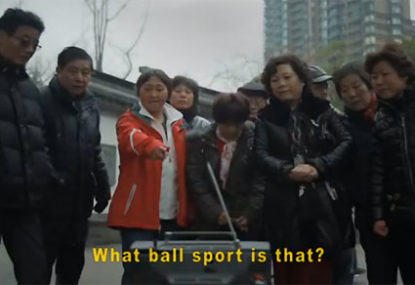It’s official. After years of appealing to parochialism, Australian Rules is attempting to broaden its horizons.
According to the AFL Community Club website, “Australian football has the capacity to bring people together from diverse cultural backgrounds.”
“Many cultures, one game” is the slogan of the AFL’s Multicultural Program. There are multicultural ambassadors, and plans for a multicultural round this season.
At the grassroots, there is even the new Masala Football Club, founded for newly arrived immigrants from the subcontinent. It’s no joke.
The new advertisement for this season is also an attempt to include newcomers to the sport, with the slogan “wherever your from, there’s nothing like our game.”
It would be cynical to not offer praise to the sport’s administrators for attempting to engage with multicultural Australia.
In a diverse nation like ours, appealing to the widest possible audience is great public relations for the sport. But is that all it is? PR?
Since expansion beyond it’s Victorian base, Australian Rules administrators have had to sell the game to the philistines. It took years for the Sydney Swans to get where they are now, and it may take even longer for the Gold Coast Suns and the GWS Giants to truly cement their places in the competition.
Indeed, there has been a significant disconnect between the games’ governance and the commentary that surrounds it.
For decades, Australian Rules has marketed and portrayed itself shamelessly as the ‘national sport.’ And yet, for all its ‘national’ credentials, since the 1980s, expansion has become essential to the game’s survival. It’s a strange contradiction.
It has been dragged kicking and screaming beyond its base in Victoria in an attempt to make the ‘Barassi Line’ history. So when the AFL talks about being the national sport, it’s getting ahead of itself.
Historian Geoffrey Blainey once wrote that footy is a genuinely Australian invention, and therefore has a leg up in the hearts and minds of Australians. But while it is true that Australian Rules is a unique product of this county, that doesn’t necessarily make it ‘national.’
The truth is, it wants to be national. Why else would it embark on a multicultural campaign? It’s not about showcasing the game’s multicultural aspect, it is about recruiting a multicultural aspect. There is an important difference.
With one in four Australians born overseas, and one in five having at least one parent born elsewhere, multicultural Australia is no longer a niche market. For all sports, diversifying their participant base and fostering an inclusive culture will be crucial to their survival.
Rugby league tried to ‘ethnicise’ the game during the late 1980s in response to the country’s changing demographics. The results are slowly starting to show, particularly in areas of Western Sydney.
Football has always been the migrants’ sport of choice, but has been slow to recognise the merits of its multicultural constituents. Only recently has the FFA started bleating about their strength in diversity.
Cricket, too, has begun the task of recruiting participants of non-Anglo backgrounds. Moisés Henriques and Usman Khawaja are already poster-boys for cricket’s next generation.
When GWS Giants were established in Western Sydney, the AFL went to great lengths to appear inclusive of all potential fans. Good luck to them. They’ll need all the help they can get in an area which is still largely indifferent to the game.
However, changing the game’s participant base doesn’t necessarily change the culture.
Indeed, Australian Rules has been home to many ethnic and Aboriginal participants over the years. Think of Robert ‘Dipper’ DiPierdomenico, or Alex Jesaulenko, or the great Indigenous player Sir Doug Nichols.
They’ve been followed by the likes of Tadhg Kennelly, Nicky Winmar, and more recently, Majak Daw and Bachar Houli.
The son of Greek-Cypriot parents, Andrew Demetriou has risen to the very top of the game’s administration.
But that hasn’t stopped a nasty nativist attitude from pervading the game’s culture. For decades, Australian Rules has waged a war to keep Australia’s most multicultural and national sport – football – foreign.
In 1951, Essendon committeeman Bill Brew lectured newly arrived migrants to play the sport of their adopted country – “people who come to this country and accept all the advantages, should support Australian Rules football instead of furthering their own code.”
In other words, play our game or go home. Was Brew the original ‘code warrior’?
Of course, this was the 1950s. We were all a little racist and xenophobic back then. But the attitude that football is invading Australian Rules’ territory has proven resilient, even as Australian society has become increasingly more tolerant.
In 2005, Geoffrey Blainey openly feared for his beloved code after watching the Socceroos qualify for the World Cup.
Similarly, The Bulletin’s John Birmingham decided that Australia didn’t need another national game, especially one that was, in his view “a waste of time.”
More recently, the AFL-mad Baz Blakeney penned his own thoughts for the Herald Sun. “This is Australia”, wrote Baz, “young and free. If you don’t believe those magical words, then rack off. And take your round ball with you.”
Over sixty years separate Blakeney and Bill Brew, but the sentiment remains the same.
For most, this is a good departure point from the so-called code wars. Some things are more important than sport. It’s about challenging racism and xenophobia.
With fans like these, it’s little wonder the AFL has quickly established a Diversity and Cross Cultural Awareness Training program.
Indeed, before they can change the song from ‘Up there Cazaly’ to ‘Up there Majak’, the AFL and some of its fans might need to reassess their own founding beliefs, and revise their antagonism to ‘foreign’ elements.
At least they’ve made a start. If you live in Melbourne and you love your footy, get along to see Masala FC. They may be a timely harbinger for change. The only question is, will the Bill Brews and the Baz Blakeney be able to keep up?





























































































